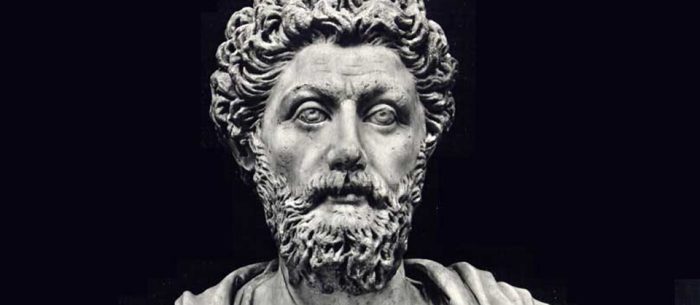Using stoicism when facing challenges in life
___
INTRODUCTION
Marcus Aurelius Antoninus was a Roman Emperor, was the last heir in long run of adoptive emperors. Born in 121 AD, he became emperor in 161 AD to rule for 19 years. He is renowned for his intellectual and philosophical contributions. During his rule he kept Romans out of danger from parthians.
Stoicism as a philosophy is credited to greeks particularly Zeno of Citium, influenced heavily from Socrates school of thought. Zeno’s philosophical inquiry led him to divide and unite scope of philosophy into 3 spheres, namely, Physics, Ethics and Logic. These together governed the people at large. Another very important philosopher was Chrysippus who is credited with orthodox stoic philosophy and had written as many as 705 books on stoicism.
Epictetus, a slave (55- 131 AD) and Marcus Aurelius are prominent examples of stoics who followed the code to the rule and wrote extensively on stoic philosophy. Currently, Massimo Pigliuccio and Ryan holiday have written on stoicism and have marketed the idea of using stoicism as a practical philosophy of living life. In this article I shall cover,
- What is stoicism?
- Using Marcus Aurelius (book, Meditations) Verses that helped me deal with challenges, with lucid explanations of meanings of those verses.
What is stoicism?
Popular understanding of stoicism is that one would call a person stoic if that person without complaining endures hardships or tragedies in life. But, there is much more than that. Important to note first is that stoicism is not a absolute perfect set of ideas. Best put stoicism is malleable to degrees of variations. Hence, a good reading of stoic philosophers one may find differences.
Stoicism suggests, that there is a Natural order to things. And one’s existence is is guided by it. Naturally then if you are stoic you understand that you are note in a symphony, meaning you are a part of the whole harmony which plays into the Natural Order of things. So, your existence is in agreement with the whole/nature.
Stoic person relies on Reason as guiding principle in his life. This Reason guides actions of a stoic. The Rational then is what is followed by Logos (here, Reason). The external stimulus is provided by the environment this causes are senses to get affected by it. Some impressions are clear and distinct other requires Reason to judge them. Hence, we may assert or avoid things based on these impressions.
The Book Meditations has many wonderful thoughts collected, recorded and written by Marcus Aurelius. In this article would like to share, in my opinion, best 5 excerpts that helps dealing with daily challenges like dealing with people, aspirations and perhaps daily struggles of life.
Here are some of the best lines from meditations
- Say to yourself first thing in the morning, today I shall meet people who are meddling, ungrateful, aggressive, treacherous, malicious, unsocial. All this has afflicted them through their ignorance of true good and evil. But I have seen that nature of good is what is right and nature of evil is what is wrong, and I have reflected that the nature of the offender himself is akin to my own – not kinship of blood or seed, but a sharing in the same mind, the same fragment of divinity. Therefore I cannot be harmed by any of them, as none will infect me with their wrong. Nor can I be angry with my kinsman or hate him. We were born for cooperation, like hands, like eyelids, like the rows of upper and lower teeth. So, to work in opposition to one another is against nature and anger or rejection is opposition. (<book> 2: <Verse> 1 )
Waking up in morning one should remind him/herself that one would usually encounter people with malicious intent. And that is alright since Marcus finds them ignorant of normativeness of things. Through reason he knows about the normativeness (correctness) of things. Marcus understands that others who are being ignorant have not yet understood order of rightness of things. Hence, one should not fill oneself with anger or hate towards them. Like our body where hands, teeth and feet occurs in coordination and cooperation. Similarly one’s own nature should be in harmony with the whole (the Natural Order).
- You should take no action unwillingly, selfishly, uncritically or with conflicting motives. Do not dress up your thoughts in smart finer, do not be gabbler or a meddler. Further, let the God that is within you be the champion of being you are – a male, mature in years, a Roman, a ruler: one who has taken his post like a soldier waiting for retreat from life to sound, ready to depart, Past the need for any loyal oath or human witness. And see that you keep a cheerful demeanour and retain your independence of outside help and peace which others can give. Your duty is to stand straight not held straight.(2:5)
To put it in a crude way one must take all that comes up in our life willingly, with no harm to others and with mindfulness of why it has occured. Marcus advices not to swim in the superficiality of things but be sensitive to all that affects you. In all that you see yourself, remember to remain cheerful no matter what happens and that your individuality remains intact, unruffled by help of others yet maintaining your individuality when listening to others.
- Remember this, retreat into your own little territory within yourself. Above all, no agonies, no tensions. Be your own master, and look at things as a man, as human being, as citizen, as moral creature. And here are two most useful thoughts you will dip into. First, that things cannot touch the mind, they are external and inert, anxieties can come from your internal judgement. Second, that all these things you will see change almost as you look at them and then will be no more. Constantly bring to mind all that you yourself have already seen changed. The Universe is changing: life is judgement.(4:4)
Your mind is your temple where you seek solace and comfort, your mind should be at peace. This will only happen when through reason you understand that nothing can disturb your mental peace. Those things which are affecting you are external and bother you only when you pass judgement over it, example, before giving an exam I know I have not studied that well. Hence, when giving the exam there are good chances of getting an anxiety. Your internal judgement should be based upon good reason on any matter that concerns you. Since all things are subject to change it is your reason that will guide you. (to reason is to think or contemplate)
- Do not trouble yourself, keep yourself simple. Someone does wrong? He does wrong to himself. Has something happened to you? Fine. All things happens has been fated by the whole from the beginning and spun for your own destiny. In sum, Life is short: Make your gain from the present moment with right reason and justice. In sum, life is short: make your gain from the present moment with right reason and justice. Keep sober and relaxed.(4:26)
The idea is to keep your mind de-cluttered from things that bother you. If someone has bothered you or have done wrong by you then according to Marcus it will reflect in the natural order, meaning can be said similar to what doctrine of karma suggests. You are fated from the beginning to end of what you endure. You should use these obstacles and gain from it, a better understanding of order, things, people.
- Be like the Rocky headland on which waves constantly break. It stands firm and round it the seething waters are laid to rest.
Lastly, you should be firm in your convictions and your thoughts that no one except your reason changes your beliefs. Metaphor used suggests you to be as a rock, in essence, firmity in mind should be same as that of a rock on shore breaking the waves.
All things said, as a person one should have general optimism towards life and make most of challenges and opportunities which comes thy way.
______________________________________
Author: Shantanu Harshwardhan
Image credit: alexrovira.com
 Share on bsky
Share on bsky




Read 1 comment and reply